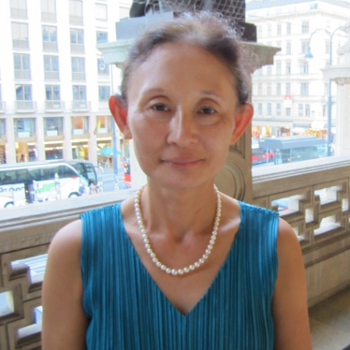Four years after its première, Deutsche Oper Berlin’s Parsifal, directed by Philipp Stölzl, remains an enigma. During the prelude, the curtain opens to a tableau depicting Christ’s crucification. The spear that pierces Christ and the Grail that receives his blood are featured. The rocky landscape of Golgotha becomes Monsalvat. Gurnemanz’s Act I narrative has simultaneous graphic enactments atop two sides of the stage. Seduced by Kundry, Amfortas is stabbed by his own spear by Klingsor, who has defiled himself because he was rejected by the knights. Everything is “in your face” Christian, including the knight’s medieval costume with red crosses. The transformation scene, however, introduces the chorus dressed as knights and disciples in a frantic orgy of self-flagellation, ending with them charging against the unseen enemy with weapons in hand.
Parsifal is in modern costume with coat and tie. Kundry’s long black robe remains unchanged throughout, as does Amfortas’s medieval garb. In Act II, Parsifal stumbles into the Aztec Empire, where a human sacrifice is performed by Klingsor, who extracts the victim’s heart with the spear as he is surrounded by women in white robes. The women reveal their more sensuous attire underneath for Parsifal, but these “flower maidens” are after Parsifal’s heart as well, and almost succeed when Kundry’s cry of “Parsifal” interrupts them. The end of the act sees Parsifal stabbing Klingsor in the back and walking off with the spear.
In Act III, the Grail community is transported to the modern times with listless people milling about in a desolate landscape. The transformation scene has the crowd forcing Amfortas bearing a cross to march. The crowd, not Parsifal, baptizes Kundry against her will. Amfortas dies by the spear held by Parsifal, while Kundry survives in despair as the crowd worships Parsifal. The transformation from innocent fool to wise redeemer is subjugated in the production which focuses on showing religious fanaticism in three guises: Christianity, the Aztec, and modern times. The director is more interested in the dark side; there is no salvation through compassion but continuation of the same oppression.
The musical performance of the evening was of highest quality, enough to supplant the negative aspects of the visually stunning and well directed performance. As Parsifal, Klaus Florian Vogt’s youthful and clarion tenor was very much on display throughout while his low notes were clearly articulated. He sang with both tremendous power and delicate softness, sometimes in the same phrase. His bewilderment and sadness in Act I was heartbreaking, while his progression from impressionable man to determined hero in Act II was convincing, and in Act III Parsifal’s emotional maturity to command respect was astonishing. The final minutes of the opera, as Parsifal sings the healing power of the spear and his willingness to officiate the ritual, were glorious, and many in the audience were in tears as the music came to its beautiful conclusion.
The entire cast was strong. Thomas Johannes Mayer’s voice was rich, round and warm, and he communicated Amfortas’ anguish by coloring every word with emotion. It was a complete vocal and stage performance. After slight initial difficulty with high notes, Stephen Milling as Gurnemanz was a towering presence, both in his powerful physique and his deep and sonorous voice, anchoring Acts 1 and 3. Derek Welton, as a youthful Klingsor, was in full command of the role from the first utterance, his bass-baritone flexible, clear and elegant. As Titurel, Andrew Harris impressed in his brief appearance with his well articulated bass.
Parsifal's Act II seduction scene presents a major vocal and acting challenge to a tenor and a mezzo. The mezzo must sing first as a maternal figure, then a seductress, and finally a desperate woman. Daniela Sindram, a newcomer to Kundry, showed a remarkable mastery of the role. Her voice was clear and steady with no sign of vibrato throughout the range, and what range she had! The infamous “lachte” that covers almost two octaves from top to bottom was exemplary, and her phrasing was lyrical. Vogt sang Parsifal’s awakening with enough power to wake up the entire audience, and from there on he and Sindram sang with such intensity and focus that no one seemed to breathe. It was a magnificent and miraculous Act II.
Donald Runnicles led the Orchestra of Deutsche Oper Berlin with an emphasis on the overall arc of Wagner’s music. Instead of meticulous attention to detail, what emerged were continuous waves of music, always propelling the story. He was supportive of the singers and controlled the volume as needed. When he let go, as in the orchestral passages of the transformation scenes, the orchestra was brilliant, the brass outstanding. The strong chorus rounded out a memorable evening.




